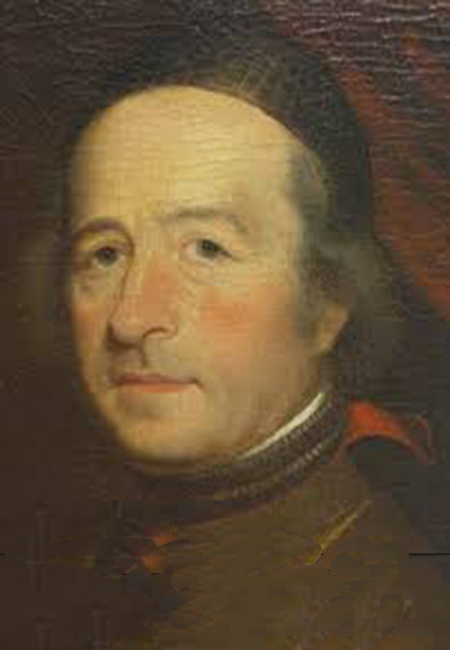Du Bourg, Archbishop Louis William Valentine
1833, December 12
Date of Birth: 1766, February 14
Louis William Valentine Du Bourg was born at Cap Français in San Domingo on February 14, 1766. At the age of two he was sent to Bordeaux, from which his family originally came. He made his literary studies at the college of Guyenne and his Theology at the "Little Seminary" of St. Sulpice in Paris. Towards the end of 1788, Father Nagot, who had opened at Issy a little community in which the rudiments of Religion and Literature were taught to young men exhibiting dispositions toward priesthood, placed Father Du Bourg, recently ordained, at the head of that house. The [French] Revolution having occasioned his leaving there, he emigrated to Spain and stayed there about a year and a half. At length having made up his mind to go to the United States – wither Father Emery had sent some priests of the Society – Father Du Bourg arrived at Baltimore on December 14, 1794. In the following year, with the express consent of Father Emery, Father Nagot admitted him to the Society.
During his first three years in America Father Du Bourg was President of Georgetown College. Then in 1798 he went with Father Flaget to help Father Babad in the establishment of a college in Havana. Their efforts were unsuccessful. In 1799 Father Du Bourg returned to Baltimore and there founded St. Mary’s College; he was its president from 1800 to 1810 and from 1811 to 1812. He collaborated with Father Du Bois in the founding of a minor seminary at Emmitsburg, and with Mrs. Elizabeth Seton in the establishment of the Sisters of St. Joseph.
Named Vicar Apostolic of Louisiana, Father Du Bourg left Baltimore on October 18, 1812, to go to New Orleans. When he reached that city he was confronted with dismaying obstacles – he was even in danger of losing his life. Eventually he decided to leave for Rome in order to inform the Sovereign Pontiff of the condition of the mission confided to him. Some time after coming to the Eternal City, i.e. on September 15, 1815, the Pope named him Bishop of New Orleans; and on Sunday, September 24th, he was consecrated in the Church of St. Louis of France by Cardinal Doria, who was assisted by the former Bishop of St. Malo and the Bishop of Terracina. In the time between his consecration and his departure for America, Bishop Du Bourg busied himself in gathering resources, both money and missionaries, for the vast diocese crying out for them, the diocese for which he had assumed responsibility.
With his co-workers he left Bordeaux on June 28, 1817, aboard a naval vessel put at his disposal by the government. He landed the following September 4th at Annapolis, the capital of Maryland, and spent some time in Baltimore. Having obtained permission to transfer his see-city to St. Louis, Missouri, in Upper Louisiana, he reached there on January 5, 1818.

Archbishop Du Bourg
He lost no time in concerning himself with the means of accomplishing the good contemplated by him over a two-year span: he founded a seminary which he put in charge of the Vincentians; he established two ecclesiastical colleges, one in St. Louis, the other in New Orleans; he entrusted to the Ursulines and the Madames of the Sacred Heart the education of upper-class young ladies, and that of girls of a lower class to the Lorettines or Sisters of the Cross; he laid the foundation of his cathedral, sought to erect three new dioceses by dividing his own, etc.
Finally after seven years of an exhausting apostolate, “after being involved in troubles and difficulties both within and without, buffeted by slander, his health broken, a victim of spiteful betrayal and even of sacrilegious theft, the missionary bishop resolved to go back to France to spend the rest of his days in a retirement which would allow him to regain his health." Therefore, having asked for and obtained from the Pope the necessary authorization, Bishop Du Bourg left America early in 1826; he landed at Bordeaux in the beginning of August. But that city, bereft of Archbishop D’Aviau, had just been given Bishop Cheverus of Montauban as its new archbishop. On the intervention of Bishop Frayssinous, a royal decree of August 13, 1826 named Bishop Du Bourg to replace him; and at the end of November he took possession of his new see.
From the very beginning the Bishop of Montauban set valiantly to work, and he continued so for about six years. The king, doubtless willing to reward his zeal, named him, on February 15, 1833, to the archepiscopal see of Besançon, vacant by reason of the death of My Lord de Rohan-Chabot. Archbishop Du Bourg effectively took possession on October 10, 1833. But two months later, on December 12th, he gave his soul to God at the age of 68 years, 10 months, and 29 days.
Translation from Bibliothèque Sulpicienne, Volume III, pp. 206-209.
